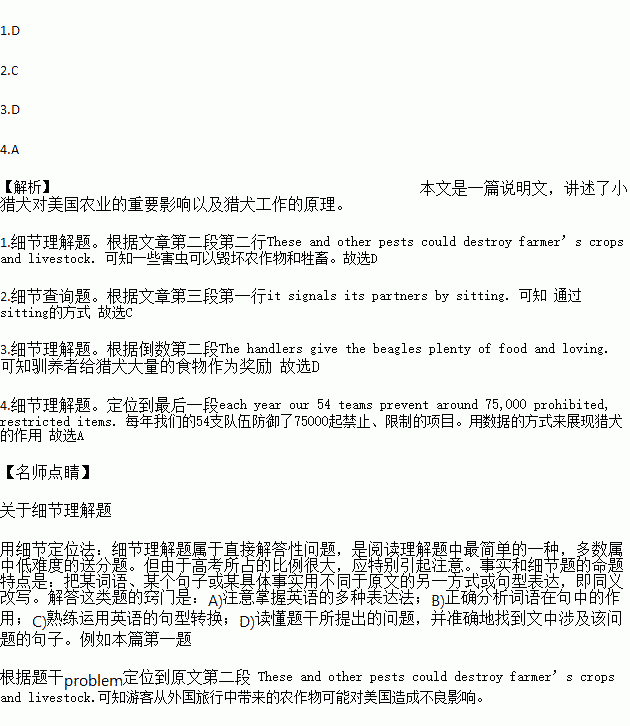题目内容
The Beagle Brigade
Return to the United States from a trip abroad, and your luggage will get inspected by the U. S. Department of Agriculture’s Beagle Brigade. Working with human canine officer partners, the beagles sniff out potential threats to American agriculture.
An orange or apple, for example, might harbor a Mediterranean fruit fly. Hams could carry a disease such as hog cholera. These and other pests could destroy farmer’s crops and livestock. “Once we introduce something that is not part of the environment, there may riot be any controls for it in the environment,” notes USDA’s Lisa Davis at the National Dog Detector Training Center in Orlando, Florida. “The best thing for us to do is to prevent it from coming across the border and becoming established. ’’
When a beagle sniffs specific food odors, it signals its partners by sitting. The human officer then investigates. When the dog is right—which happens 90 percent of the time——it gets an edible treat.
“The dog is not out there working,” explains Davis. “It’s out there playing. It’s a game to the dog.” The handlers give the beagles plenty of food and loving. They make sure they get first-class medical attention, too. When the dogs finally retire after 9 to 11 years, the USDA finds caring homes for them. It’s a dog’s life indeed!
How well does the Beagle Brigade do its job? “On average,” notes Davis, “each year our 54 teams prevent around 75,000 prohibited, restricted items.” Since even one infested (为患的) item could cause widespread destruction, that’s a great result for America’s agricultural environment.
1.According to the article, what is a problem with agricultural products brought into the United States by passengers traveling from abroad?
A. They generate similar types of food odors.
B. They are difficult to identify, even with trained dogs.
C. They must be inspected before being allowed to enter the country.
D. They may carry something that could harm the agricultural environment.
2.According to the article, how does the beagle signal that it has found a suspicious food product?
A. By barking at its partner. B. By begging for a treat.
C. By sitting next to the item. D. By playing a game.
3.How is the beagle congratulated for finding a specific food product?
A. The handler praises it with a hug.
B. The beagle gets to play for a few hours.
C. The beagle gets to retire to a caring home.
D. The handler gives it an edible reward.
4.In the article, the author supports the use of the Beagle Brigade by .
A. providing statistics about the number of items detected by the dogs
B. showing that the dogs enjoy discovering prohibited items
C. pointing out that good homes are found for the dogs when they retire
D. praising the fact that the dogs work for a government agency


 are the hardiest and need little extra care. Hybrid tea roses and other roses are more likely to need winterization to survive or remain healthy.
are the hardiest and need little extra care. Hybrid tea roses and other roses are more likely to need winterization to survive or remain healthy.